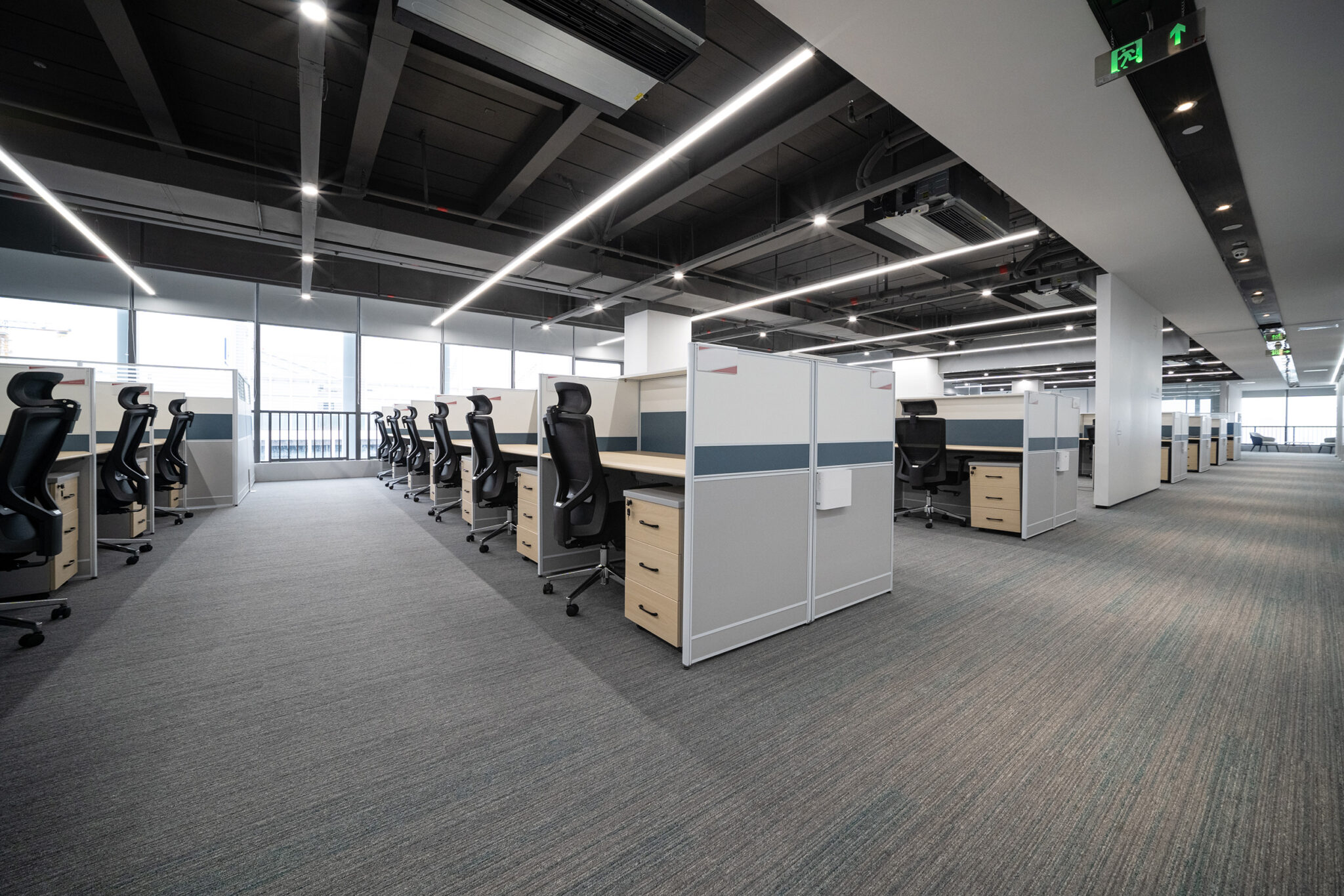Could high office-vacancy rates damage economy this year?

Getty Images
Kenneth Rogoff sees tough road for some banks as surge of real estate loans come due by 2025, but doesn’t expect wider meltdown
Demand for downtown office space has plunged since the pandemic. Even now, as many businesses have ended or cut remote or hybrid work, office building vacancy rates are high, ranging from 12 percent to 23 percent in Boston and other major U.S. cities, depressing property values.
That downturn coupled with the Federal Reserve’s hesitation to reduce interest rates has a growing chorus of financial experts and market watchers alarmed about the potential for widespread bank losses (or even failures) if there are significant delinquencies among the surge of commercial real estate loans expected to mature by 2025. Such problems could, they fear, have a domino effect, rattling the wider economy.
Twenty percent of the $4.7 trillion in commercial mortgage debt held by lenders and investors comes due this year. On average, commercial real estate loans comprise about a quarter of lenders’ assets, according to the Mortgage Bankers Association.
Kenneth Rogoff is a professor of economics and the Maurits C. Boas Chair of International Economics at Harvard. An expert on financial crises, Rogoff spoke to the Gazette about whether the wave of debt coming due poses real risks for U.S. banks and the economy. This interview has been edited for clarity and length.
Are the fears of widespread bank failures and forced consolidations warranted?
Yes, and no. There are definitely going to be a lot of firms that invest in commercial real estate who are going to see their equity wiped out, and the losses will be so big — with many buildings selling for half of what investors paid for them — that debt will get hit hard also. On its own, though, this will not cause a full-blown financial crisis, especially in the context of a still-solid global economic outlook.
This is not to say that the losses won’t hurt. Many pension funds are big holders of commercial real estate funds, as are insurance companies. Certainly, some of this will spill over into the banking system. There are hedge funds and private equity firms that have a lot of loans from banks. But banks, particularly the large banks, were given very strict financial regulation after the [2008 financial]crisis. They weathered the pandemic, obviously. Small and medium-sized banks, who have been more lightly regulated, could get hit harder, and some may go under.
But for better or worse, the Fed has shown a willingness to bail out most out, if needed. Commercial real estate is absolutely a slow-moving train wreck, but it’s not necessarily a replay of 2008-2009. Two other shoes would have to drop before we could be talking anything like that.
Many of the people who invest in commercial real estate are optimists who believe that long-term interest rates are going to come down, and they’ll end up being OK. A popular phrase has been “Stay alive till ’25,” on the view long rates will ultimately come down.
My recent research has looked at seven centuries of real interest data and reaches the conclusion that interest rates over the next decade are likely to remain, on average, not far from where they are today, with the new normal looking a lot like the old pre-global-financial-crisis normal.

Kenneth Rogoff, Thomas D. Cabot Professor of Public Policy from Harvard University’s Economics Department, is pictured in Littauer Center. Stephanie Mitchell/Harvard Staff Photographer
File photo by Stephanie Mitchell/Harvard Staff Photographer
What’s to blame for this looming crisis?
When interest rates were low, too many investors thought they would be low forever. Commercial real estate became over-leveraged, over-borrowed, and unprepared for having interest rates go up.
At the same time, the pandemic crushed demand for office buildings, especially in the U.S., where current occupancy rates (on average over the week) still hover around 50 percent in major cities. And it’s not going away quickly. Internationally, the situation is less severe. In Europe, people have much smaller homes and shorter average commuting distances, and therefore, have been more willing to come back to the office.
Some parts of the commercial real estate market in the U.S. are still doing well. For example, the so-called super-premium buildings that have amenities such as air filtration. You would think that with the shortage of housing, cities would be turning some of the unoccupied office buildings into apartments. Unfortunately, that turns out to be complicated not only from a zoning point of view, but also from an engineering point of view. These buildings, with a lack of interior windows, low ceilings, not to mention the placement of elevator shafts and electric lines, were just not designed to be turned into apartments.
Can anything be done to head off the “slow-moving train wreck”?
It would help a lot if long-term interest rates collapsed because then they can start refinancing. As noted, I consider that unlikely outside of a period of deep recession, though, of course, it is possible. No doubt part of the adjustment process will involve a lot of bankruptcies. But, in real estate, people go through bankruptcies all the time (as Americans realize better than ever). It’s part of their business model.
How might this scenario harm consumers or the U.S. economy?
Aside from losses through pension funds, there will be pockets of deep pain in regional banks, and that could well impact those areas more broadly, both in terms of lower consumption and tougher lending terms.
But let’s remember that so far, this is happening in the context of a solid job market and a booming stock market. In a way, we are looking at a part of the economy that’s particularly suffering, when, on the whole, the paradox is that the economy hasn’t been suffering more with the high interest rates.
So, for example, while some of the losses in commercial real estate will ultimately hit some consumers, many have also gained (for example through their pension funds) on the booming stock market. That’s why I mentioned you need another shoe (or two) to drop. Of course, if we have a giant recession, it will create many other problems and greatly amplify the commercial real estate crisis.
Earlier this month, a top executive at Pacific Investment Management Company (PIMCO), one of the world’s largest asset managers, warned that regional banks could be the hardest hit. What impact could a huge wave of delinquent commercial real estate loans in that sector have on the U.S. banking system?
As discussed above, some regional banks went big into commercial real estate and are vulnerable today. This is particularly problematic for the smaller banks that were not required to abide by the same capital requirements as the larger banks. The small and medium-size banks had a problem just over a year ago when rising interest rates reduced the value of long-term loans banks had made at low interest rates.
After a couple went under, however, the Fed came in and bailed the rest out through a lending program where taxpayers took on a fair bit of risky loans to these banks. That definitely could be a problem down the road, but for now, having a few regional banks go under is not the same thing as having a giant such as Citi, Bank of America, or J.P. Morgan get into trouble. That would be a different order of magnitude.
Are the six largest banks — Bank of America, Citi, Goldman Sachs, JPMorgan Chase, Morgan Stanley, and Wells Fargo — sufficiently prepared to withstand a possible cascade of bad commercial real estate debt?
The big banks are more diversified, and they’re making money in other areas. High interest rates have been an incredible money machine for the banks because they have gotten away with not fully passing the higher rates on to their depositors. And so far, the depositors haven’t moved their money out into higher-paying assets.
All in all, commercial real estate is definitely a major problem are in the economy, but it’s more on the order of having a major emerging market such as Turkey or Mexico default. It would be a terrible problem, but not on its own bring down the global economy.
Get the best of the Gazette delivered to your inbox
By subscribing to this newsletter you’re agreeing to our privacy policy




